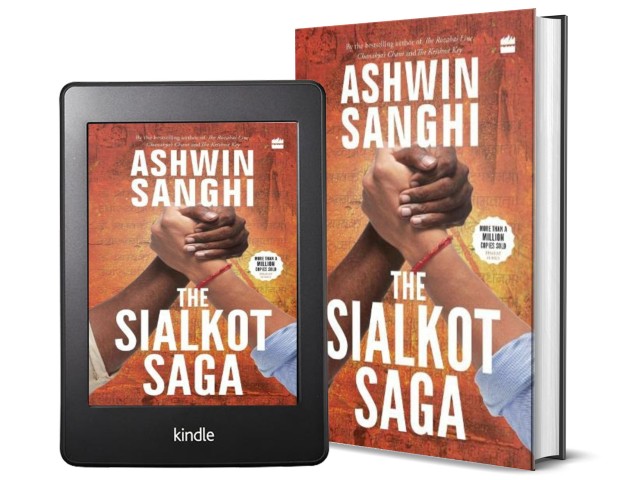Author Ashwin Sanghi has attained success in the world of books with his well-received mythological/historical fiction books including Chanakya’s Chant, The Krishna Key, Keepers of the Kalachakra, etc. We have admired the author as his books have become more enjoyable with each new book, backed with good research and delivered in styles of a thriller to keep the reader interested to the end. Below are some links to the reviews of the author’s books, published here at Thinkerviews:
- The Vault of Vishnu
- Keepers of the Kalachakra
- The Krishna Key
- Chanakya’s Chant
- Sauvastika: The Struggle of Shantiputra
And recently, we added The Sialkot Saga to this list of books that we have enjoyed reading. Published in 2016, this book is slightly different from the author’s other work as it charts relatively recent course of India’s history. And here is our review of this book on behalf of Team ThinkerViews.
| Book Title | : | The Sialkot Saga Bharat Series - 4 |
| Author | : | Ashwin Sanghi |
| Published by | : | Westland Ltd ( 2016) |
| # of Pages | : | 590 (Paperback) 673; 1231 KB (Kindle EBook) |
| # of Chapters | : | 9 |
| Purchase Link(s) | : |
This Is Here In For You
Book Cover:
Let us take a look at the cover page of this book, the gateway to the fictional story explored within.

The Sialkot Saga by Ashwin Sanghi | Book Cover
As you can see in the image above, the book cover shows two hands hold together to show support, encouragement and unity with one another. You can also see a hand wearing a red thread. The cover page definitely tries to represent the communal harmony and brotherhood amongst nations. The yellow-to-saffron-to-red background is eye catcher.
A moderately attractive cover page, which will appeal to the readers of suspense thrillers.
Storyline:
The author takes us to the Punjab border in 1947, as the state is being split into two and carnage is taking place on both sides of the line such that trains are carrying corpses from one country to another. A couple of survivors are found on the train that has come from Sialkot.
And now we start following the trajectory of two young boys – Arvind and Arbaaz, as they live through India of 1950 to 2010.
Arvind Bagadia is growing up in Kolkata in a Marwari family, where from very young age, he starts working at minting money. As he grows up, he falls in love with Paromita, to eventually lose her to the Hindi film industry. Arvind marries Abhilasha and has twin sons Vinay and Vineet. But, by this time, he has also pulled some of the cheekiest and most notorious scams to build up a significant business for himself. He continues the shady business practices without a qualm and continues to pile money.
Arbaaz Sheikh loses his father at early age and has to take his job as a dock worker. Soon though, Arbaaz ventures into the crime world and over the years becomes trusted lieutenant of Abdul Dada. Their ventures include narcotics, smuggling, matka and lots more. In one such venture, Arbaaz meets Paromita and eventually they get married and have a daughter called Alisha.
As Arbaaz’s businesses are legitimized to keep up with times, he and Arvind Bagadia develop a rivalry where one is trying to defeat the other. While Arvind cultivates politicians and ministers, Arbaaz becomes one.
But, fate strikes and Arvind loses his mother Shakuntala and son Vineet in the same day. On the other side of the world, Vinay and Alisha meet in USA and get married in spite of vocal disapproval of parents on both sides.
But while these lives are being played out in the 21st century, we also see the thread that takes us from Ashoka to Maharaja Ranjit Singh through illustrious monrachs like Samudragupta, Nagbhata, Harsh, and others. What is the secret that ties all these benevolent rulers and how does it connect to the lives of people mentioned above?
Views and Reviews:
As you can see from the storyline, the book includes two separate timelines – one from 250 BCE to today and one from 1947 – 2010, which is not unlike the author’s other books. However, the 20th century timeline is in front and the way author weaves names, events and incidents, is like reading a contemporary history or watching a motion picture set over the past half century. This segment will be particularly appealing to the readers who have grown up in that era or have heard of all major events including political and cultural, rise and fall of certain individuals, who may or may not remind you of well-known names. The author also puts modern spin on such events. For example,
In 1951, a man called Acharya Vinoba Bhave had started travelling across India asking wealthy landlords to voluntarily give up a piece of their land to landless labourers. It was known as Bhoodan. Sharing was caring.
The book is easy to read as the author keeps the language simple and at many places adapts well-known quotations (which are also provided in the reference list at the end of the book), to suit the situations:
Generally, the intelligent end up in the employment of the smart.
No one cared how you got your money, as long as you had it.
One should be cautious, when others are eager and be eager when others are cautious.
A chisel is a dangerous tool, it can alter historical narratives at will.
A good growth rate is achieved by knowing the rules; a great growth rate is achieved by knowing the exceptions.
I believe in God, but I don’t trust his managers. They’re greedy, inefficient and overpaid. I’m not even sure whether they convey my messages to him.
You may note above that there are quite a few sentiments about money, and there are a lot more insights into the world of business and trading as it has changed over decades from share certificates to dotcom bubble to modern day investors as the author charts Arvind’s trajectory of buying and selling businesses. Especially, the world of share trading, that can easily become gambling, when those in the know bet on certain outcomes, while driving the masses towards achieving those outcomes through clever publicity.
These are companies with no track record, no revenue, no skilled management and certainly no prospect of ever being profitable. Yet the market loves them.
And that the intrinsic value of things is not always the indication of how these things will be valued in the market:
The greater fool theory states that the price of an object is determined not by its intrinsic value, but rather by irrational beliefs and expectations of market participants. As long as there is a greater fool around the corner willing to pay a higher price, the value will continue to rise.
Arbaaz on the other hand gets steered into the world of business and then politics as a sideline to give a veneer of respectability to his criminal acts. Over time, both the characters meet prominent figures in Indian political, business and spiritual world and while they both can be deemed successful in the worldly ways, they also sustain personnel losses and the author has captured the importance of living in the moment through few very simple lines:
Why do we treat the fleeting day
With so much needless fear and sorrow?
Its in its nature not to stay
Today is always gone tomorrow
There are occasional typographical errors, but the book remains enjoyable through to the end. The author builds up the suspense to the point where the relationship between the two timelines and the main characters is explained. And finally, the title of the book falls into place.
Summary:
In summary, an interesting mystery for the readers who enjoy suspense thrillers that combine historical elements in an entertaining manner…
ThinkerViews Rating:
Around 8 stars out of 10.
Quick Purchase Links:
- Buy - The Sialkot Saga by Ashwin Sanghi - Paperback - Amazon IN
- Buy - The Sialkot Saga by Ashwin Sanghi - Kindle EBook - Amazon IN
- Buy - The Sialkot Saga by Ashwin Sanghi - Paperback - Amazon US
- Buy - The Sialkot Saga by Ashwin Sanghi - Kindle EBook - Amazon US
Over To You:
If you already have read the book do share your remarks and thoughts via comments below. Does this review help you in making your decision to buy or read the book? Do not forget to share this article with your friends over various social networks. Please follow/subscribe us on various Social networks like Twitter, Facebook, YouTube, Spotify, Amazon Prime Music, Audible, and others. And yes, you may like to subscribe to our RSS feeds to get latest updates for the site to land right in your mail box.
 ThinkerViews – Views And Reviews Personal views and reviews for books, magazines, tv serials, movies, websites, technical stuff and more.
ThinkerViews – Views And Reviews Personal views and reviews for books, magazines, tv serials, movies, websites, technical stuff and more.



